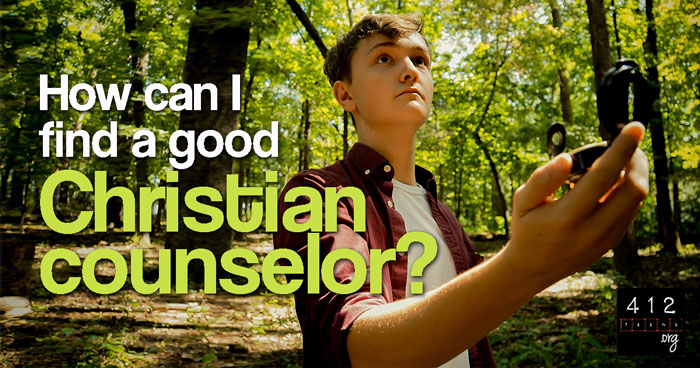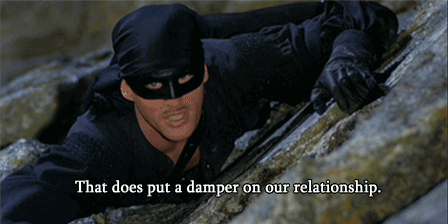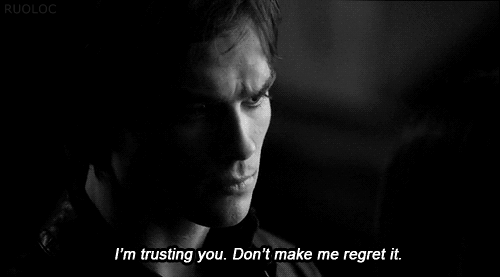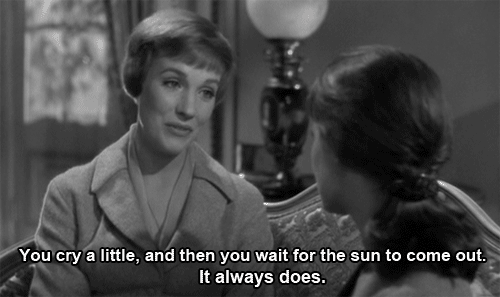How do I choose a good Christian counselor/therapist?

Depending on your background, the idea of Christian counseling may be a scary one. Here at 412teens, we are 110% in your corner, and we'll do our best to equip you for this journey.
Psychotherapy (a fancier term for counseling and therapy) is "the treatment of mental disorder by psychological rather than medical means" and has only been around since the late 1800s/early 1900s. In the 1970s, Christianity began to seek a Christ-focused means of therapy as an alternative to the secular theories developed by Sigmund Freud and others throughout the last 50 years. The first wave of "Christian counseling" methods completely shunned psychology as a whole. But today there are more and more Christian counselors who find value in psychological research and in applying therapy techniques alongside Scripture in counseling.
Why Christian counseling, specifically?
It can be very uncomfortable for a Christian to open up the deepest wounds of their heart to someone who may not even believe the Christian faith is true, let alone rational. Secular counselors are not supposed to discourage the faith of their client, but sometimes just knowing they don't share it is enough to place a wall between client and counselor. If you don't feel safe with your counselor, then it's not a healthy (or helpful!) match.

As we seek help for our minds, we will also be directed on how to heal our hearts. Our emotional, mental, and spiritual health are very tightly interwoven. They affect each other. As Christians, we know the only way our hearts can truly heal is through the grace of God and the touch of the Holy Spirit. A secular counselor may give us coping mechanisms to manage the mind, but they do not fix the wounds to the soul.
In Christian counseling, we should be given physical and mental therapy techniques to manage the symptoms of distress, yes. But along with coping mechanisms, spiritual direction toward Scripture will help deepen our relationship to the source of healing, Jesus Christ.
I've been spiritually abused. Should I seek Christian or secular counseling?
There are good and bad Christian counselors as well as good and bad secular counselors. Survivors of spiritual abuse often feel trapped between the desire to heal their soul and a deep distrust of any sort of "religious guide." This leads to an extremely painful conflict in their hearts. A secular counselor may not understand the survivor's need to reconcile what their Christian community should have been with what it was, and a Christian counselor may be unable to gain the trust of the survivor.
As hard as it is, you won't be able to tell if any given counselor is right for you without first meeting with them and evaluating the interaction. Ask the Holy Spirit to give you peace and wisdom as you go into your initial meeting (James 1:5). Here are some hallmarks of good Christian counselors to help give you some things to look out for:
A Good Christian Counselor Will Understand
There are Christians who deeply desire to counsel but are poorly trained (or not trained at all). There are also counselors who claim a Christian faith and work with a Christian counseling organization but don't seem to be walking the faith themselves. Christian counselors/therapists, just like secular counselors/therapists, are also flawed people—albeit flawed people with special training. But even with training and education, no counselor or therapist will be the perfect fit for every person.
People are diverse in their temperaments, backgrounds, triggers, insecurities, prejudices, etc., and each person seeking counseling will need to find a counselor who understands their emotional needs. Are you a shy, insecure person? Then you will likely need someone with stronger empathy who can read the micro-shifts in your mood and respond accordingly. Do you have trauma issues with a specific gender or authority figures of that gender? Then you'll likely need someone who is not that gender.
A good Christian counselor will listen to what you're saying, not just assume they know what you're saying. They will find ways to walk in your shoes, no matter your wound. They will know how to affirm what you're doing right and guide you away from unhealthy reactions and habits. Your counselor should feel like an ally, a comforter, an encourager—not another stressor to deal with.
A Good Christian Counselor Will Know the Bible
A good Christian counselor will have a healthy understanding of biblical truth. Unfortunately, it's a common story for ill-trained, well-intentioned Christian counselors to give Bible verses to their clients to "fix" a problem those verses were not intended to address. Instead of helping, this can deepen the wound.
Some questions to ask yourself: Does your Christian counselor recognizes the importance of context in interpreting the Bible? Does your Christian counselor approach the Bible as a story of grace and redemption? Does your Christian counselor help you understand how the verse and its context applies to your situation?

A good Christian counselor will also recognize the needs of different hearts according to 1 Thessalonians 5:14: "And we urge you, brothers, admonish the idle, encourage the fainthearted, help the weak, be patient with them all."
Even beyond that, they will know how to admonish, how to encourage, and how to be patient. They will recognize that the Holy Spirit works the change in healing the soul, not their own actions.
Ask for God Help
You might want Christian counseling specifically to help with your relationship with God. If so, you may feel stuck. "So I need to know God well enough to know how to identify someone who will accurately help me get to know God better?" I know, this seems like a Catch 22.
Even if you feel like you're not "doing the Christian thing right," please know that God's love for you hasn't changed (Malachi 3:6). Neither has His availability and desire to help you: "Likewise the Spirit helps us in our weakness. For we do not know what to pray for as we ought, but the Spirit himself intercedes for us with groanings too deep for words. And he who searches hearts knows what is the mind of the Spirit, because the Spirit intercedes for the saints according to the will of God" (Romans 8:26-27).

Pray for guidance, even if it's just "God help me." He hears you. He will guide you through the rough process of finding a Christian counselor. We'll be praying for you too.
ALSO SEE:
- Should a Christian see a psychologist, psychiatrist, or counselor?
- What does the Bible say about mental illness?
- How to Do a Mental Health Check
- What is spiritual abuse?
- What are some signs of spiritual abuse?
- How do I heal from spiritual abuse?
- How can I honor or show respect to an abusive parent?
- How should a Christian deal with SAD (Seasonal Affective Disorder)?
- Are coping mechanisms sinful?
- Is it wrong for a Christian to be depressed?
- What does the Bible say about recovering from PTSD?
- Am I being sexually groomed?
- When You've Done Everything but Feel Nothing
- Trusting Jesus in the Darkness


TL;DR
Some Christian counselors focus purely on using the Bible to counsel, but many use a blend of Scripture-filtered therapy techniques and psychological research. A good Christian counselor should be willing to understand and work with your emotional needs. They will be your ally—not another obstacle in your healing. A good Christian counselor will know how to properly apply the Bible (2 Timothy 3:14-16; 1 Thessalonians 5:14;). We urge you to pray, even if it feels like you're not "doing it right." God's love for you never changes (Malachi 3:6), and the Holy Spirit will communicate your heart (Romans 8:26-27).

Writer/Editor: September Grace
September is an avid film nerd from growing up on weekend trips to Universal Studios Hollywood. She is passionate about the intersections of Christian spirituality, faith, and storytelling in popular culture. Outside of 412teens and digging up obscure horror flicks from the 2000s, she works as a freelance developmental editor and acquisitions consultant while comforting her clingy feline floof, Faust, from the anxiety of existence.
